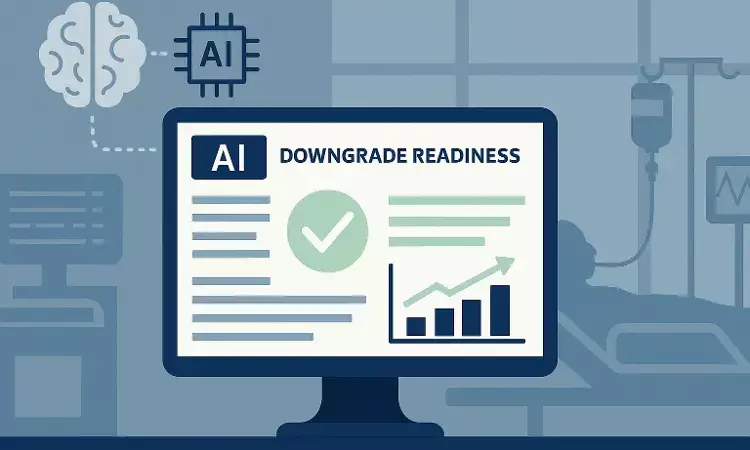- Home
- Medical news & Guidelines
- Anesthesiology
- Cardiology and CTVS
- Critical Care
- Dentistry
- Dermatology
- Diabetes and Endocrinology
- ENT
- Gastroenterology
- Medicine
- Nephrology
- Neurology
- Obstretics-Gynaecology
- Oncology
- Ophthalmology
- Orthopaedics
- Pediatrics-Neonatology
- Psychiatry
- Pulmonology
- Radiology
- Surgery
- Urology
- Laboratory Medicine
- Diet
- Nursing
- Paramedical
- Physiotherapy
- Health news
- Fact Check
- Bone Health Fact Check
- Brain Health Fact Check
- Cancer Related Fact Check
- Child Care Fact Check
- Dental and oral health fact check
- Diabetes and metabolic health fact check
- Diet and Nutrition Fact Check
- Eye and ENT Care Fact Check
- Fitness fact check
- Gut health fact check
- Heart health fact check
- Kidney health fact check
- Medical education fact check
- Men's health fact check
- Respiratory fact check
- Skin and hair care fact check
- Vaccine and Immunization fact check
- Women's health fact check
- AYUSH
- State News
- Andaman and Nicobar Islands
- Andhra Pradesh
- Arunachal Pradesh
- Assam
- Bihar
- Chandigarh
- Chattisgarh
- Dadra and Nagar Haveli
- Daman and Diu
- Delhi
- Goa
- Gujarat
- Haryana
- Himachal Pradesh
- Jammu & Kashmir
- Jharkhand
- Karnataka
- Kerala
- Ladakh
- Lakshadweep
- Madhya Pradesh
- Maharashtra
- Manipur
- Meghalaya
- Mizoram
- Nagaland
- Odisha
- Puducherry
- Punjab
- Rajasthan
- Sikkim
- Tamil Nadu
- Telangana
- Tripura
- Uttar Pradesh
- Uttrakhand
- West Bengal
- Medical Education
- Industry
AI Tool Cuts Neuroscience ICU Stay by Nearly 8 Hours Without Increasing Readmission Risk

A real-time artificial intelligence (AI) tool integrated into ICU workflows reduced length of stay (LOS) in a neuroscience intensive care unit (NSICU) by 7%—approximately eight hours—without raising unplanned ICU readmission rates.
The study, published in the Journal of Healthcare Management(March/April 2025; Vol. 70, Issue 2; pp. 126–136), was conducted at Tampa General Hospital(TGH), a large academic tertiary care and safety-net center in the United States with over 50,000 discharges and 30,000 surgical procedures annually. As part of a multidisciplinary ICU performance improvement initiative, researchers collaborated with GE HealthCare’s Command Center to develop a Downgrade Readiness Tile (DRT) aimed at streamlining patient transitions out of the NSICU. The goal was to alleviate ICU bed capacity strain—averaging above 90%—by enabling earlier identification of patients clinically appropriate for downgrade to lower-acuity units.
The DRT utilized over 76 real-time clinical variables extracted from the electronic medical records and displayed AI-generated assessments of downgrade eligibility with a target accuracy exceeding 95%. Instead of merely identifying indicators of clinical stability, the model flagged patients based on the absence or presence of clinical barriers to transfer. If no active criteria were met and no transfer order was initiated, the system automatically suggested downgrade readiness; if three or more barriers were present, it signaled ineligibility.
Implemented in January 2022, the DRT was used during daily multidisciplinary rounds (MDRs), where bedside nurses presented structured clinical data before the AI tool provided transfer recommendations via unit-wide displays. After six months, the average LOS in the NSICU declined from 4.15 to 3.88 days, equating to a 7% reduction or nearly eight hours. Moreover, transfer orders were placed over three hours earlier, significantly enhancing ICU throughput. Importantly, the rate of ICU bouncebacks remained unchanged at 3%, indicating that clinical safety was not compromised despite accelerated transfers.
Due to the success observed in the neuroscience ICU, similar AI-powered DRTs are now being deployed in TGH’s medical ICUs. The authors emphasized that unlike conventional clinical assessments limited to morning rounds, this AI-driven model supports continuous, real-time decision-making and can issue transfer prompts at any time throughout the day.
This study underscores the potential for AI to augment critical care workflows, optimize resource utilization, and maintain high standards of patient safety—all while reducing system-level strain in high-demand hospital settings.
Reference: Kittur K, Dombrowski K, Salomon K, et al. Leveraging Artificial Intelligence to Reduce Neuroscience ICU Length of Stay. J Healthc Manag. 2025;70(2):126–136. DOI: 10.1097/JHM-D-23-00252.
Meghna A Singhania is the founder and Editor-in-Chief at Medical Dialogues. An Economics graduate from Delhi University and a post graduate from London School of Economics and Political Science, her key research interest lies in health economics, and policy making in health and medical sector in the country. She is a member of the Association of Healthcare Journalists. She can be contacted at meghna@medicaldialogues.in. Contact no. 011-43720751


